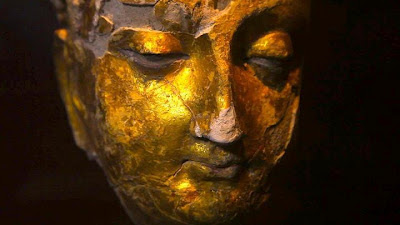Well, this is set to auto-post at 12:12 on 12-12-12, even I do not have anything meaningful to say. Here it is right before Christmas, and I am like the snowman you see above: a lot of hungry rabbits and one lousy carrot.
So, then --
The Year In Review.
This coming Saturday is the first anniversary of the landmark legal decision that made it O.K. for me to tame debbils any which way seems useful at the time. In honor of the event, someone has gone out and found the following commentary from Trungpa Rinpoche, which thoroughly divests any sense of either dismay or satisfaction I might personally feel, lest I become (a) impatient, or (b) an exhibitionist.
"Always Abide by the Three Basic Principles
"The three basic principles are also described as [1] keeping the two vows, [2] refraining from outrageous action, and [3] developing patience.
"The first is keeping the promises you made when you took the refuge and Bodhisattva vows, keeping them completely. This one is quite straightforward.
"Number two is refraining from outrageous action. When you begin to practice lojong, you realize that you shouldn't have any consideration for yourself; therefore, you try to act in a self-sacrificing manner. But often your attempt to manifest selflessness becomes exhibitionism. You let yourself be thrown in jail or crucified on the cross... Many of our American friends have done such things. However, that approach should be regarded as pure exhibitionism rather than as the accomplishment of Bodhisattva action.
"Number three is developing patience. Usually, there is extreme confusion about patience. That is to say, you can be patient with your friends but not with your enemies; you can be patient with people whom you are trying to cultivate or your particular proteges, but you cannot be patient with people who are outside of your protege-ism. That kind of extreme is actually a form of personality cult, the cult of yourself, which is not such a good idea. In fact, it has been said that it is absolutely NOT a good idea."
I felt so much better when I saw this I went ahead and read it three times.
This coming Saturday also marks the day when I will begin a retreat with flexible boundaries, scheduled to end on February 20th, or the first Guru Rinpoche Day of the forthcoming Year of the Snake. In this particular case, "flexible" doesn't necessarily imply anything less than "strict;" rather, it means that certain longstanding obligations will be observed, and certain karmic linkages will be examined -- this last rather joyfully, I imagine. However, I hasten to say this will not be one of those "retreats" where one posts one's sterling visions on the Internet, so you can expect a fair amount of silence from hereabouts. We'll save all hoopla for a grand finale somewhere down the shaky river.
This coming Solstice, on Friday the 21st, which is supposed to be a big problem if you are Mayan, is also the first anniversary of my departure from Baltimore, Maryland's tender ministrations and new age hospitality. If the world ends, that will be some kind of symmetry, eh?
Maybe I should also interject that this year's Ngenpa Gu Dzom or Nine Bad Omens is from 23:48 on the 18th until 22:36 on the 19th, and Zangpo Chu Dzom or Ten Auspicious Omens is from 22:36 on the 19th until 22:36 on the 20th. So this shakes out as Ten Auspicious Omens on Thursday, Solstice on Friday, and Guru Rinpoche Day on Saturday the 22nd.
This coming December 27th is the anniversary of Kyabje Thinley Norbu Rinpoche's passing, so that is something to keep in mind. Dudjom Rinpoche's anniversary coincides with New Year's Eve this year, and Longchenpa's anniversary comes a month later on January 30, 2013. Gutor is February 9, 2013, and Losar is February 11, 2013.
Speaking personally, the year now passing brought a host of fortunate events, emotional trials, and medical challenges. Was disposed of deceptive attendants and transient "friends;" they were replaced by true practitioners: true spiritual friends. Had heart surgery again on January 9th, followed by useful hospitalizations at intervals thereafter -- a longstanding and difficult to diagnose condition was, at long last, properly diagnosed and treated. I now have the right medications, and even have a therapist who comes twice a week and helps me with agility and balance issues. This is all a blessing, you know?
The year now gone also marked the death of my dear Little Mister Bee Rabbit in the spring, and my beloved Marshimaro Usagi rabbit in June, just shy of his seventh birthday. This brought great sadness into my life, but was relieved by being reunited with a very old, very dear companion who was lost for many years, and is now ever so thankfully found.
I also now have three new rabbits, rescued from a chicken coop in a Chinese suburb.
I cannot say that anything was actually accomplished this year. I was able to see the Dalai Lama in the spring, had some stupas made in the summer, and so forth, but as you will have noticed, I didn't write very much at all. I regret that I simply did not have sufficient energy to do something and nothing at the same time, so I opted to do nothing.
So, Merry Christmas to you all, Happy New Year to you all, Happy Losar to you all, and a heartfelt prayer that all your wishes for the benefit of sentient beings come spontaneously true exactly as envisioned. I'll be back when I get back, and I will try to write more in 2013, for those of you who enjoy my writing.
Many, many blessings to you.




















































